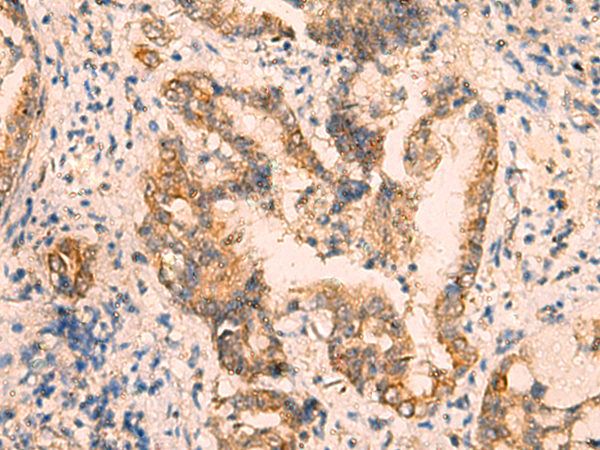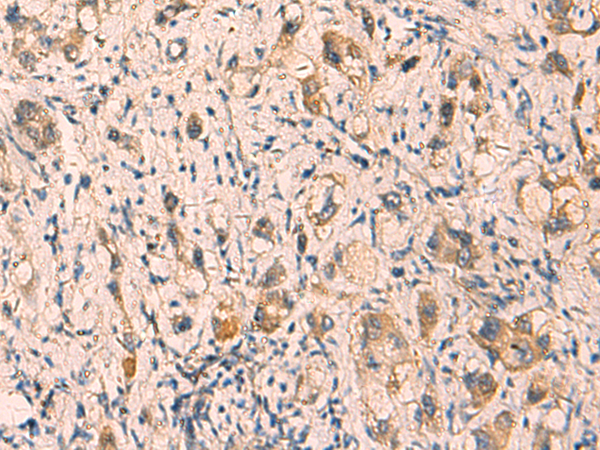


| WB | 咨询技术 | Human,Mouse,Rat |
| IF | 咨询技术 | Human,Mouse,Rat |
| IHC | 1/50-1/200 | Human,Mouse,Rat |
| ICC | 技术咨询 | Human,Mouse,Rat |
| FCM | 咨询技术 | Human,Mouse,Rat |
| Elisa | 1/5000-1/10000 | Human,Mouse,Rat |
| Aliases | THBP; DFNA40 |
| WB Predicted band size | 34 kDa |
| Host/Isotype | Rabbit IgG |
| Antibody Type | Primary antibody |
| Storage | Store at 4°C short term. Aliquot and store at -20°C long term. Avoid freeze/thaw cycles. |
| Species Reactivity | Human, Mouse, Rat |
| Immunogen | Fusion protein of human CRYM |
| Formulation | Purified antibody in PBS with 0.05% sodium azide and 50% glycerol. |
+ +
以下是关于CRYM抗体的3篇参考文献及其摘要的简要概述:
---
1. **文献名称**:*"Crystallin μ (CRYM) is a critical mediator of thyroid hormone-dependent hearing in mice and humans"*
**作者**:Nadol Jr JB, et al.
**摘要**:该研究通过免疫组化技术使用CRYM抗体,揭示了CRYM蛋白在内耳组织中的高表达,并发现其突变与遗传性耳聋相关,提示其在听觉功能中可能参与甲状腺激素信号调控。
2. **文献名称**:*"Thyroid hormone-binding properties of human μ-crystallin"*
**作者**:Suzuki T, et al.
**摘要**:作者利用CRYM抗体进行蛋白质印迹和免疫沉淀实验,证实CRYM通过与甲状腺激素T3结合调控细胞内激素水平,可能影响神经发育及代谢疾病的发生机制。
3. **文献名称**:*"CRYM as a novel biomarker in hepatocellular carcinoma: Insights from proteomic profiling"*
**作者**:Braun M, et al.
**摘要**:通过CRYM抗体的免疫组织化学分析,研究发现CRYM在肝癌组织中的表达显著下调,提示其可能作为肿瘤抑制因子,并参与癌症代谢重编程的分子通路。
---
以上文献均涉及CRYM抗体的实验应用(如定位、功能验证或疾病关联分析),涵盖听觉、代谢及癌症研究领域。如需具体文献年份或期刊信息,可进一步补充检索。
CRYM (μ-crystallin), encoded by the *CRYM* gene, is a protein initially identified in the lens of the eye, where crystallins maintain lens transparency. Beyond ocular tissues, CRYM is expressed in the thyroid, kidney, and nervous system, suggesting diverse physiological roles. It functions as a ketimine reductase, metabolizing sulfur-containing amino acids, and binds thyroid hormones (T3) with high affinity, implicating it in thyroid hormone regulation and cellular metabolism. CRYM also interacts with cytoskeletal components, influencing neuronal structure and function.
Mutations in *CRYM* are linked to neurological disorders, including autosomal dominant non-syndromic hearing loss and neurodevelopmental conditions. Its role in hormone binding and metabolic pathways has spurred interest in neurodegenerative and metabolic diseases. CRYM antibodies are essential tools for studying these mechanisms, enabling detection of protein expression, localization, and interactions in research models. They are widely used in techniques like Western blot, immunohistochemistry, and immunofluorescence to explore CRYM's tissue-specific functions and dysregulation in disease. Recent studies also investigate CRYM's potential as a therapeutic target or biomarker, particularly in thyroid dysfunction and neurological pathologies.
×